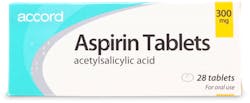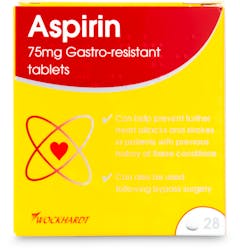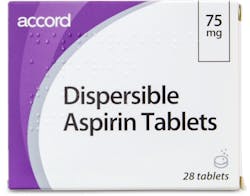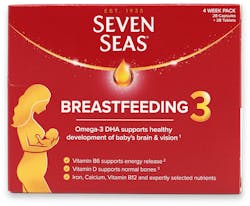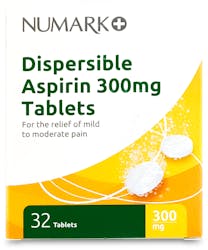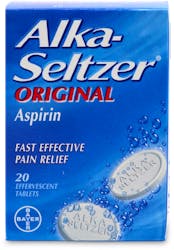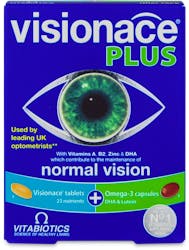Actavis Aspirin 300mg 28 Tablets
Actavis Aspirin 300mg 28 Tablets
What 500,000+ customers say about medino:
Description
" Actavis Aspirin 300mg 28 Tablets is a non-steroidal anti-inflammatory drug (NSAID) used to alleviate pain, reduce fever, and decrease inflammation. It is appropriate for adults and children over 16 years old. Aspirin has been extensively studied and proven effective for treating various conditions, including headaches, muscle aches, toothaches, and menstrual cramps.
Key features
- Contains 300mg of aspirin per tablet
- Provides fast-acting relief for pain and fever
- Reduces inflammation associated with various conditions
- Suitable for adults and children over 16 years of age
- Packaged in a pack of 28 tablets
- Easy to swallow and digest
What symptoms or conditions can be treated with Actavis Aspirin 300mg 28 Tablets?
Actavis Aspirin 300mg 28 Tablets can be used to treat pain, fever, and inflammation associated with various conditions, such as headaches, muscle aches, toothaches, menstrual cramps, and arthritis.
What are the benefits of using Actavis Aspirin 300mg 28 Tablets?
The main benefits of using Actavis Aspirin 300mg 28 Tablets include fast-acting relief for pain and fever, reduction of inflammation, and effective treatment of various conditions.
How does Actavis Aspirin 300mg 28 Tablets work?
Aspirin works by inhibiting the production of prostaglandins, chemicals that contribute to pain, fever, and inflammation. By blocking the enzymes responsible for prostaglandin synthesis, aspirin helps alleviate these symptoms.
Are there any known side effects?
Aspirin may cause side effects such as stomach upset, heartburn, and indigestion. In rare cases, it can also cause more serious side effects like stomach bleeding or ulcers. It is important to follow the recommended dosage and consult with a healthcare professional if any adverse effects occur.
What does the research say about Actavis Aspirin 300mg 28 Tablets?
Numerous studies have confirmed the efficacy of aspirin in treating pain, fever, and inflammation. Aspirin has been used for over a century and is one of the most widely researched and used medications worldwide.
What are the main ingredients or components of Actavis Aspirin 300mg 28 Tablets?
The main active ingredient in Actavis Aspirin 300mg 28 Tablets is acetylsalicylic acid (aspirin). The tablets also contain inactive ingredients such as maize starch, microcrystalline cellulose, and magnesium stearate.
How long does it take for Actavis Aspirin 300mg 28 Tablets to take effect?
Aspirin is a fast-acting medication, and most people experience relief from pain and fever within 30 minutes to one hour after taking it. However, the time it takes to take effect may vary depending on the individual and the condition being treated.
Ingredients
Active ingredient: Aspirin 300mg
Usage and Instructions
Adults, the elderly and children over the age of 16 years:
Take 1 to 3 tablets with water, every 4 hours.
Do not take more than 4 doses in any 24 hours.
A lower dose is recommended for the elderly.
Do not exceed the stated dose.
If symptoms persist for more than 3 days consult your doctor.
Warnings
Do not give this medicine to children under the age of 16 unless your doctor tells you. This is because there is a possible association between Aspirin and Reye's Syndrome when given to children. Reye's syndrome is a very rare disease, which can be fatal.
Do not take Aspirin 300mg Tablets if you:
Are allergic to aspirin, NSAIDs (which includes those when in attacks of asthma, angioedema, urticaria or rhinitis have been precipitated by aspirin or any other NSAID) or any of the other ingredients.
Have a stomach ulcer or have had problems with ulcers in the past.
Suffer from haemophilia or any other bleeding condition
Suffer from gout or had in the past.
Are in the last 3 months of pregnancy or are breastfeeding.
Take special care and tell your doctor before taking Aspirin 300mg Tablets if you:
Are intolerant to some sugars as these tablets contain lactose.
Have asthma or have ever had it in the past.
Have dehydration.
Have been told you are deficient in glucose-6-phosphate dehydrogenase.
Are in the first 6 months of pregnancy.
Tell your doctor or pharmacist before taking Aspirin 300mg Tablets if you are already taking any of the following medicines, as their effectiveness may be influenced by aspirin if they are taken at the same time:
Metoclopramide (for sickness and digestive disorders).
Blood thinning medicines such as Heparin, Warfarin or nicoumalone.
Corticosteroids e.g. hydrocortisone (which can be used for arthritis, asthma and inflammatory conditions).
Anti-inflammatory medicines or steroids for pain and inflammation e.g. ibuprofen.
High blood pressure medicines e.g diuretic/water tablets, Angio-II receptor antagonists or ACE inhibitors.
Epilepsy medicines e.g. Phenytoin, Sodium valproate.
Methotrexate (for psoriasis, arthritis or tumours).
Antacids for indigestion.
Probenecid or sulphinpyrazone for gout.
Anti-depressants e.g. citalopram.
Side Effects
Probably the most well known side effect of aspirin is that it has the potential to cause serious side effects like ulcers or bleeding in the stomach or intestines. These problems are more likely in elderly people and those who've had peptic ulcers in the past. The risk can also be increased by taking certain other medicines.
Other possible aspirin side effects include:
- Increased time taken to stop bleeding or other bleeding problems (see below).
- Sensation of ringing, or other noise in the ears (tinnitus).
- Confusion.
- Allergic reactions such as skin rash, swelling of the lips, tongue and throat (angioedema) or narrowing of the airways (bronchospasm or asthma attack - see below).
Tell your doctor about any side effect that is troubling you. However, it's particularly important that you do this without delay if you experience any of the following:
- Any breathing difficulties or wheezing, or swelling of the face, throat or tongue.
- Any sign of bleeding in your stomach or intestine, for example vomiting blood and/or passing black/tarry/bloodstained stools.
- Any other unusual bleeding, for example nosebleeds, purple spots or bruising under your skin, blood in your urine or coughing up blood.
- Severe skin reactions, such as a widespread itchy rash, blistering or peeling of your skin.
